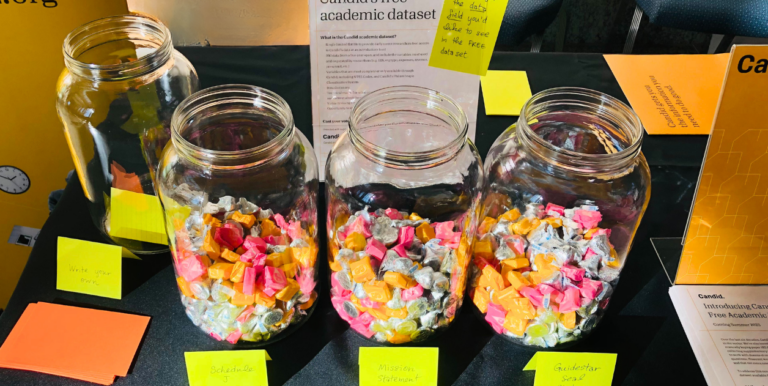Candid Data for Academics: Go back to school with better data

Back-to-school season can mean different things for different people. To college students, it might mean the start of a new year of knowledge and self-discovery. For parents, it might mean shopping for supplies and mapping out carpool schedules. At Candid, it means thinking about how we can get more data into the hands of academic researchers for the betterment of the social sector.
Candid has long worked with academic researchers to create custom data sets to answer specific research questions, a service we continue to offer. For example, Sarah Wiley, a DBA candidate at the University of Missouri, St. Louis recently used Candid’s data to explore the link between nonprofit mission statements and fundraising efforts. She found that small nonprofits fared better in their fundraising when their mission statements had positive, hopeful messages; while larger organizations fared better when their missions focused on the problems they are trying to solve.
Another example is the work of Brad Fulton, associate professor in the O’Neill School of Public and Environmental Affairs at Indiana University. Brad uses Candid data to better understand the scope and scale of religious organizations in the nonprofit sector. He has found that faith-based nonprofits can be difficult to identify and sometimes operate differently than secular organizations. In a recent study, he and his colleagues found that 17% of public foundations are faith-based; and that these organizations tend to be older, have more assets, and distribute more money (compared to secular public foundations).
Studies such as these provide valuable insights for nonprofits and foundations and highlight the fact that both academic and social sectors benefit when academics analyze nonprofit data. However, we know that many researchers don’t have the resources to purchase a custom data set. This is why, with support from the Alfred P. Sloan Foundation, we are launching Candid Data for Academics, a free, limited data set available exclusively for academic researchers.
What’s in the data set
Candid Data for Academics focuses on information about U.S. nonprofits. To make sure that the data offered is useful to academic researchers, we spoke with many researchers before rolling out this program. We also conducted a (highly unscientific) candy-poll at ARNOVA’s conference last November. In this poll, we asked researchers to take a candy from a candy-jar labeled with the data field most important to them (the options were: mission statement, IRS schedule J, Candid Seal of Transparency status). It was a close race with candy being removed steadily from all the jars—leading us to include all three data fields in the data set.
More broadly, the data set includes datapoints from the Form 990 fiscal years 2014-2018 and compensation information from the IRS Schedule J, as well as data that are exclusive to Candid (e.g., paper filings, Candid Seal of Transparency status, and the Philanthropy Classification System).
Reducing barriers to furthering knowledge
One of the main reasons we are launching this initiative is to encourage diverse and innovative approaches to analyzing nonprofit data, which we believe will, in turn, accelerate learning.
Research about the social sector is growing in the United States and around the world. But we often hear from researchers that they struggle to access the recent, affordable, high-quality data they need to understand the sector. Offering a completely complimentary data set to academics will help level the playing field when it comes to accessing data about the social sector—increasing usage of our data among scholars who might not have large research budgets. We also believe that with no entry fee for accessing data (either in dollars or time spent building data sets), emerging scholars from diverse fields might be more willing to use nonprofit data to test out new theories and methodologies, adding to our sectors’ collective knowledge.
How to apply for access
All researchers at institutions of higher education are invited to apply for access to this data for individual academic use (research projects conducted outside of academia or sponsored by external funders are not eligible). Early career academic researchers and those at smaller academic institutions are particularly encouraged to apply. Researchers can learn more about the data set, apply for access, and submit general inquiries here.
Know someone who you think would benefit from Candid Data for Academics? Applications are now open! We invite academic researchers from around the world to add “get free data from Candid” to their back-to-school list this fall. We can’t wait to see what new research you explore and information you uncover.








Kate, Digital Communications Manager, Candid says:
To apply for the data set visit: https://candid.org/use-our-data/custom-data-services/data-for-academics
Stacey McKinley says:
How do I apply? I used Guidestar EDU in the past. It seems much harder to use the Candid web site.
Lanre Adigun says:
I want to commend and align with Candid Data for Academics for this initiative. I have the conviction that this will go a long way in revolutionizin research in all ramifications. Keep up the Good job.
Bob Moss says:
Great service!